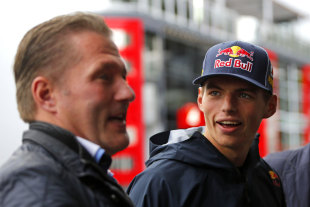

From a personal perspective, the arrival of Max Verstappen into Formula One fills me with fear. I have no qualms about the young driver's natural aptitude or race craft, as he would not be given a chance with the Red Bull junior programme if he were significantly lacking in either department.
No, my issue with Verstappen is that he is the first driver young enough to be my child. And that is a terrible watershed for any F1 journalist.
As is only to be expected, much of the paddock chatter surrounding Verstappen this weekend in Belgium has been riffs on his age. The poor lad is too young to drive on the roads in his home country, he can't vote, and nor can he legally partake of podium champagne (neither of Toro Rosso's 2015 drivers will be legally old enough to drink in the States). The cruder jokes focussed on ages of consent around the world…
But the jokes are just a cover for our incredulity. There's no denying that Max has natural talent in spades. He is in his first season of single-seater racing, and despite coming with no backing from a big team until very recently is acquitting himself brilliantly in Formula 3. The step up to F1 will be a big one, but it is by no means impossible. Time will tell how quickly the young racer adjusts, and whether or not the 2015 STR will be a car capable of giving him the space to show off his talent.
Red Bull's oft-criticised driver development programme does have a tendency to scoop them up young and then spit them out when they're still young, careers in tatters. It's a harsh mistress. But you can't argue with the results of a programme that has thus far produced a quadruple world champion and two very exciting talents in the form of Daniel Ricciardo and Daniil Kvyat, at least one of whom looks to be a future champion.
Kvyat and Ricciardo are two very different case studies of the junior programme. Ricciardo was allowed to develop his racecraft over the course of a year spent winning the British Formula 3 championship and a season (and change) in WSR before being given the chance to develop as an F1 driver first with HRT and then Toro Rosso. It hardly needs saying that Ricciardo has shown up very well indeed against Sebastian Vettel this season.
Kvyat's route to F1 has more in common with Verstappen's high-speed promotion. The young Russian was parachuted into a Toro Rosso race seat after winning the 2013 GP3 title, and his arrival was greeted with all manner of incredulity and confusion from the media before Kvyat shut up his doubters in the best possible way: by letting his car do the talking.
Verstappen will arrive in F1 with the burden of his famous father around his neck, however. While Kvyat attracted initial media attention due to his youth, both he and Ricciardo were given the freedom to make mistakes in relative obscurity. There was coverage of both men's progress, naturally, but they were given the same sort of attention as any other racer for a mid-field team once the shine of their arrival had worn off.
That is not a luxury Max Verstappen will have. Long before he signed for Red Bull, his every appearance in the paddock - alongside his famous father - was punctuated by flashbulbs and video cameras. The arrival of the Verstappen family was an event, even if no member had plans to get behind the wheel.
Now that the 'son of' has his chance - and has been given it at an astoundingly young age - that level of attention will only increase. And that is the biggest challenge that the young Verstappen faces: to figure out how to make mistakes in public while learning from them. If he can conquer that, he can conquer Formula One.
